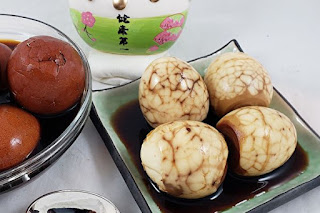Tea in Chinese Cuisine
Before the 7th century, Chinese people regarded tea as medicine and food. One may perceive this concept from the culture preserved in some Chinese ethnic groups isolated in rural areas. Because of their disconnection from the outside world, they kept some ancient traditions for thousands of years.
For example, the Jino Chinese ethnic group in Southwest China has a "tea leaf salad" made from fresh tea leaves mixed with red chili pepper, minced garlic, ginger, salt, and mountain spring water.
The Bai ethnic group, also in Southwest China, is famous for its "Three-Course Tea" to welcome guests. The first course of "Bitter Tea" was a direct brew of baked and ground tea leaves. The bitter flavor reminds one that life starts with hardship. The second course was "Sweet Tea" A host added honey and baked walnut chips to brewed tea. So after enduring hardship, one can taste the happiness of life. The final course was "Mixed Flavor Tea" with honey, salt, ginger, and pepper. People will complete their journey of life with a mixed feeling about their experiences.
My family belongs to the Han ethnic group, which constitutes 92% of the Chinese population. We have regarded tea as a drink for over a thousand years, except for one popular dish: Chinese tea leaf eggs. Every family has a slightly different recipe. Everyone claim that they are good at it. Aged and broken tea leaves are the best to make this dish. That is how my family get rid of tea leaves that were going to expire.
It starts with hard-boiled or soft-boiled eggs. Crack them but do not peel them. Add tea leaves, salt, and five-spice powder to water, boil to make a brine. Then soak the cracked eggs in the brine and keep warm for over six hours or even longer. The brine would penetrate the eggshells' cracks, forming an uneven pattern after the eggs are peeled and served. The tea leaf eggs are great as a nutrient breakfast, lunchbox addition, or midnight snack.
We do not know how long tea leaf eggs have been existing in China. Isn't it fascinating to think about the lifestyle of people living a thousand years ago, eating the same food, reading the same books? How did they solve problems in their relationship or career? We need more stories like the "Three-Course Tea" so that their wisdom can help us today.
For example, the Jino Chinese ethnic group in Southwest China has a "tea leaf salad" made from fresh tea leaves mixed with red chili pepper, minced garlic, ginger, salt, and mountain spring water.
The Bai ethnic group, also in Southwest China, is famous for its "Three-Course Tea" to welcome guests. The first course of "Bitter Tea" was a direct brew of baked and ground tea leaves. The bitter flavor reminds one that life starts with hardship. The second course was "Sweet Tea" A host added honey and baked walnut chips to brewed tea. So after enduring hardship, one can taste the happiness of life. The final course was "Mixed Flavor Tea" with honey, salt, ginger, and pepper. People will complete their journey of life with a mixed feeling about their experiences.
My family belongs to the Han ethnic group, which constitutes 92% of the Chinese population. We have regarded tea as a drink for over a thousand years, except for one popular dish: Chinese tea leaf eggs. Every family has a slightly different recipe. Everyone claim that they are good at it. Aged and broken tea leaves are the best to make this dish. That is how my family get rid of tea leaves that were going to expire.
It starts with hard-boiled or soft-boiled eggs. Crack them but do not peel them. Add tea leaves, salt, and five-spice powder to water, boil to make a brine. Then soak the cracked eggs in the brine and keep warm for over six hours or even longer. The brine would penetrate the eggshells' cracks, forming an uneven pattern after the eggs are peeled and served. The tea leaf eggs are great as a nutrient breakfast, lunchbox addition, or midnight snack.
We do not know how long tea leaf eggs have been existing in China. Isn't it fascinating to think about the lifestyle of people living a thousand years ago, eating the same food, reading the same books? How did they solve problems in their relationship or career? We need more stories like the "Three-Course Tea" so that their wisdom can help us today.
(Photo Credit: https://i.epochtimes.com/assets/uploads/2020/04/12-4-600x400.jpg)


Comments
Post a Comment